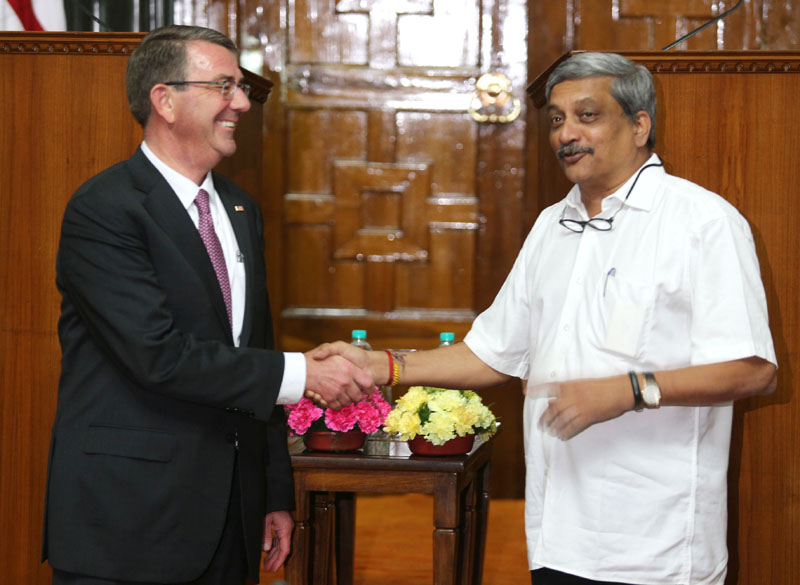India and the United States have announced their in-principle agreement to conclude a Logistics Exchange Memorandum of Agreement, and to continue working towards other facilitating agreements to enhance military cooperation and technology transfer between the two countries.
At a joint press conference with US Defence Secretary Ashton Carter on Tuesday, Defence Minister Manohar Parrikar clarified that his does not imply that troops of one country will be stationed in the other country. Carter is on an official visit to India at the invitation of the Defence Minister during April 10-13.
Parrikar hosted Carter in Goa. They visited the Indian Naval Base in Karwar and the INS Vikramaditya aircraft carrier. They also visited the USS Blue Ridge which was conducting a port call in Goa during the Secretary’s visit. Carter then traveled to New Delhi for official talks with Parrikar.
Carter’s visit marked the fourth meeting between him and Parrikar within a year, demonstrating the regular Ministerial-level oversight of the robust and deepening bilateral Defence relationship, said an Indian government press release.
During their meeting, Parrikar and Carter reviewed the important steps taken since the signing of the new Framework for the US-India Defense Relationship last June to deepen bilateral defence ties. They discussed the priorities for the coming year in defence ties, as well as specific steps both sides will take to pursue those priorities. These included expanding collaboration under the Defence Technology and Trade Initiative (DTTI); Make in India efforts of Government of India; new opportunities to deepen cooperation in maritime security and Maritime Domain Awareness; military-to-military relations; the knowledge partnership in the field of defence; and regional and international security matters of mutual interest.
Parrikar and Carter welcomed the efforts by the Indian and US Armed Forces to further expand collaboration in the years to come. Both sides acknowledged India’s participation in the Rim-of-the-Pacific (RIMPAC) multilateral naval exercise in 2016 as well as participation by the Indian Air Force in the multilateral Red Flag exercise in April-May 2016 in Alaska and US participation in the International Fleet Review of the Indian Navy at Visakhapatnam in February 2016. They expressed their desire to explore agreements which would facilitate further expansion of bilateral defence cooperation in practical ways.
In support of the India-US Joint Strategic Vision for the Asia-Pacific and Indian Ocean Region and the maritime security objectives therein, both sides agreed to strengthen cooperation in the area of maritime security. In this context, they reaffirmed their desire to expeditiously conclude a “white shipping” technical arrangement to improve data sharing on commercial shipping traffic. They agreed to commence Navy-to-Navy discussions on submarine safety and anti-submarine warfare. They also agreed to launch a bilateral Maritime Security Dialogue, co-chaired by officials at the Joint Secretary/Assistant Secretary-level of the Indian Ministries of Defence and External Affairs and the U.S. Departments of Defense and State.
Carter and Parrikar reaffirmed the importance of safeguarding maritime security and ensuring freedom of navigation and over flight throughout the region, including in the South China Sea. They vowed their support for a rules-based order and regional security architecture conducive to peace and prosperity in the Asia-Pacific and Indian Ocean, and emphasized their commitment to working together and with other nations to ensure the security and stability that have been beneficial to the Asia-Pacific for decades.
The two dignitaries reviewed the progress and reiterated their commitment to pursue co-development and co-production of advanced defence articles under the DTTI. In this context, they agreed to initiate two new DTTI pathfinder projects on Digital Helmet Mounted Displays and the Joint Biological Tactical Detection System. They commended the on-going discussions at the Jet Engine Technology Joint Working Group (JETJWG) and the Joint Working Group on Aircraft Carrier Technology Cooperation (JWGACTC). They agreed to work towards greater cooperation in the field of cutting-edge defence technologies, including deepening consultations on aircraft carrier design and operations, and jet engine technology. They noted the understanding reached to conclude an information exchange annex (IEA) to enhance data and information sharing specific to aircraft carriers.
With the aim of encouraging greater participation of US defence industries in the Make in India programme of India, Parrikar informed Carter about the recently announced Defence Procurement Policy and other reforms in the Indian defence sector. Both sides agreed to encourage their respective defence industries to develop new partnerships in the pursuit of a range of cutting-edge projects. In support of Make in India, the United States shared two proposals to bolster India’s suite of fighter aircraft for consideration of the Government of India.
